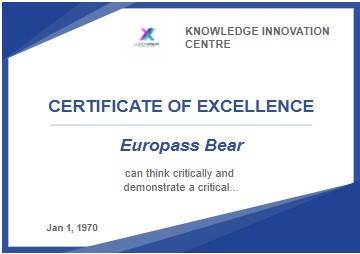Recognition of skills and qualifications
Recognition of skills and qualifications is key to support mobility, and learning and career opportunities for all across the EU.
Recognition of skills and qualifications is key to support mobility and learning as well as career opportunities for all across the EU.
There are two different procedures for recognition of qualifications:
- Recognition for further education and training
- Recognition for access to employment, including regulated professions
Recognition of qualifications for further education and training
Policy Background
The Council Recommendation of 26 November 2018 promotes automatic mutual recognition of:
- higher education and upper secondary education and training qualifications and
- outcomes of learning periods abroad.
The Recommendation calls upon Member States to, by 2025, put in place a framework to achieve automatic mutual recognition of higher education qualifications across Member States.
The Recommendation also calls for automatic and full recognition of study periods abroad and automatic recognition of upper secondary education and training qualifications that give access to higher education.
The Convention on the Recognition of Qualifications concerning Higher Education in the European Region (also known as Lisbon Recognition Convention) by the Council of Europe and UNESCO was adopted in Lisbon in 1997. It is the main legal instrument for recognition of qualifications across UNESCO’s Europe and North America region. It gives holders of a qualification from a signatory country access to assessment of his/her qualifications in another signatory country. Such an assessment and subsequent recognition can be for the purpose of:
- accessing further tertiary education
- using academic titles
- facilitating access to labour markets
Signatory countries to the Convention also committed to establishing national procedures to assess qualifications of refugees and displaced persons, even when no formal documents exist.

Information on recognition of qualifications
The ENIC-NARIC network develops joint policy and practice in all European countries for the recognition of qualifications. The network consists of the European Network of Information Centres (ENIC), established by the Council of Europe and UNESCO, and the National Academic Recognition Information Centres (NARIC), established by the European Commission.
You can contact ENIC/NARIC country offices via the ENIC-NARIC portal for further information on recognition of qualifications for further education and training.
Recognition of professional qualifications
Policy background
The recognition of professional qualifications in the EU is regulated by Directive 2005/36/EC
The Directive sets out:
- a system of automatic recognition for: nurses, midwives, doctors (general practitioners and specialists), dental practitioners, pharmacists, architects and veterinary surgeons
- a general system of recognition for other regulated professions such as teachers, translators and real estate agents and
- a system of recognition based on professional experience for e.g. carpenters, upholsterers and beauticians.
Read more information on recognition of regulated professions here or visit the database of regulated professions.
Specific frameworks
Directive 2005/36/EC does not cover professions that are governed by specific legal provisions such as sailors, statutory auditors, insurance intermediaries and aircraft controllers, lawyers, commercial agents and some other professions in transport or those handling toxic products links. Read more information on professions falling under specific legislation.
The European Professional Card (EPC) establishes an online procedure for the recognition of qualifications for 5 professions (general care nurses, physiotherapists, pharmacists, real estate agents and mountain guides).




 Facebook
Facebook
 Twitter
Twitter
 Linkedin
Linkedin